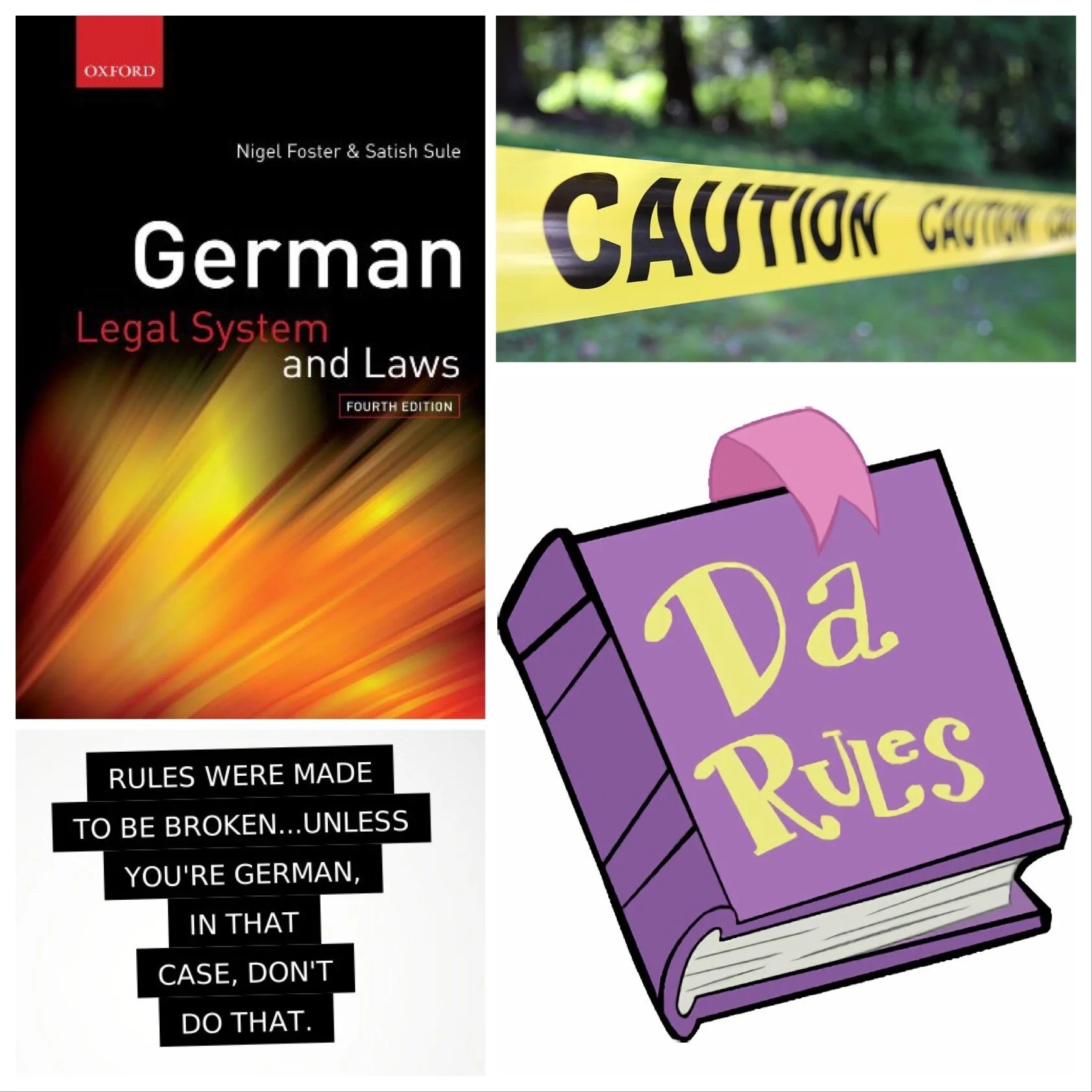What is the Rule?
When they move to a different country, there are a few things you need to learn.. A new language is usually top of the list, but a very close second is the rules. These are more than just law, there are also culture rules to be observed. When I first arrived, I was constantly reminded to beware of jaywalking or crossing the road on a red light. I was told that I could be fined by the police if caught committing this heinous crime. it was hard to take this advice seriously since I come from a culture where crossing the road is a question of personal responsibility. At first, I believed that this was the perfect example of the rule-based culture of Germany, there was a rule and people followed it to the letter. However, this was an oversimplification of German culture. Anyone who has driven in Germany knows that Germans are just as inclined as anyone else to break the law. Jaywalking is against the law here, but it is also governed by amorphous culture rules. Germans are happy to jaywalk, but they generally don’t if there is a child there to witness it. As surprising as it sounds, most Germans I know believe quite strongly that it is a responsibility of adults to set a good example to all children, not just their own.
However, it isn’t always clear to new arrivals what is an actual law and what is a cultural rule. In German it’s very clear (Regel = Rule and Recht = Law) but often the mere hint of an accent in Germany means most conversations will abruptly switch to English without any indication why. This might at first seem helpful, but often I’ve been caught out by misunderstandings over the use of the English word Law. “It is against the law” is stock answer that can mean anything from “This is just a general rule” to “I have no idea”. This miscommunication is understandable. In comparison to many other countries, Germany is very organised, which means it has a lot of rules. Sometimes those rules are obvious and are marked clearly by a warning sign or explained in terrifying levels of detail by a 236-page handbook. Other times it’s not so clear. German jurisprudence is hard to navigate than an M.C. Escher painting, and it’s often safer to assume there’s a law for or against something than to actually investigate whether it exists.
Room with a view...of the marathon.
With so many rules, and uncertainty over whether they even exist, it’s not surprising mistakes are made. An example of the type of pitfalls you might expect occurred to my wife and I a few years ago. Early one morning, we awoke to find a marathon had begun outside our apartment. A stream of marathon runners were jogging passed to a soundtrack of Enrique Iglesias, Pink and U2. Our street had been converted into a water stop for these committed sports persons and what had started at 8am as a trickle had grown into a flood of brightly attired runners, all sinewy legs and chaffed nipples. We wanted to go for lunch, but since my car was parked on what had become a main thoroughfare of the marathon, we were slightly confused about how we might go anywhere.
The question we faced was a quintessentially German; what is the rule? In this instance, there was no clear rule to follow. My wife mused that the rules were more than likely announced in the local paper at some point in the last week, but since we have not read the local paper at any point in the last four years of living in our flat, the point was academic. Our next best option was to ask someone who looked like they might be an official. When the rules are not clear in Germany, people can rely on the fact that there will be someone employed to ensure the rules are being followed, although that does not always guarantee they will know why or what to do when an exception occurs.
Big book of German laws.
Finding a young man in a hi-vis vest, my wife asked what we should do if we wanted to move the car. He suggested that we turn the car around and take the side street, which seemed a sensible conclusion. The only problem was, we live on a one-way street, a rule clearly indicated by the bright blue “Einbahnstraße” sign only meters away. Were we allowed to simply ignore it, given the extenuating circumstances? What was the rule? We might not have known if it was “against the law” in this instance, but I was certain that there would be no chance we would willingly break the law without written permission, signed in triplicate and clearly stamped by an official. In these instances, the police are only one worry for anyone intending on breaking the rules
Some Germans will not stand for wilful law breaking, no matter how small. Self-policing is rife within Germany. People have few qualms about correcting rule breakers, either to simply help newcomers or to ensure respect for the system. Rules were not created magically; they did not spring forth from a bureaucratic wand. Rules and laws have been developed over years, decades and centuries, by experts with a clear understanding of the problems that society needed fixing. Those laws have been optimised and reviewed, corrected when faulty through civic action and by public discussion with the government. The British cynicism of pointless “red tape” has led us to some dark places recently and at this point I’m willing to give the Germans the benefit of the doubt.
Further Reading: German Basic Law
In any event, our young advisor was mistaken as the side road he had directed us to was blocked by a large red plastic barrier. Our next stop was to ask another, older looking hi-vis wearing official person, who said that the most obvious thing to do would be to simply drive the wrong way up the street and then take a right. Although uncomfortable, my wife agreed it was the only option we had. She put the car into reverse and worked her way backwards up the street. This is an example of the German answer to rule breaking; when in doubt, slightly damage the rule, kick it a little or trip it up, but try not to break it.
As she reached the older official, she thanked him for his help through the open car window.
He looked at my wife quizzically and asked “Why did you reverse? You could have just driven up the street normally”.
“It’s a one-way street, better to reverse up it than break the law”, My wife nonchalantly replied.
“Interesting” he replied sarcastically “I’ll need to have a good think about that rule”.









